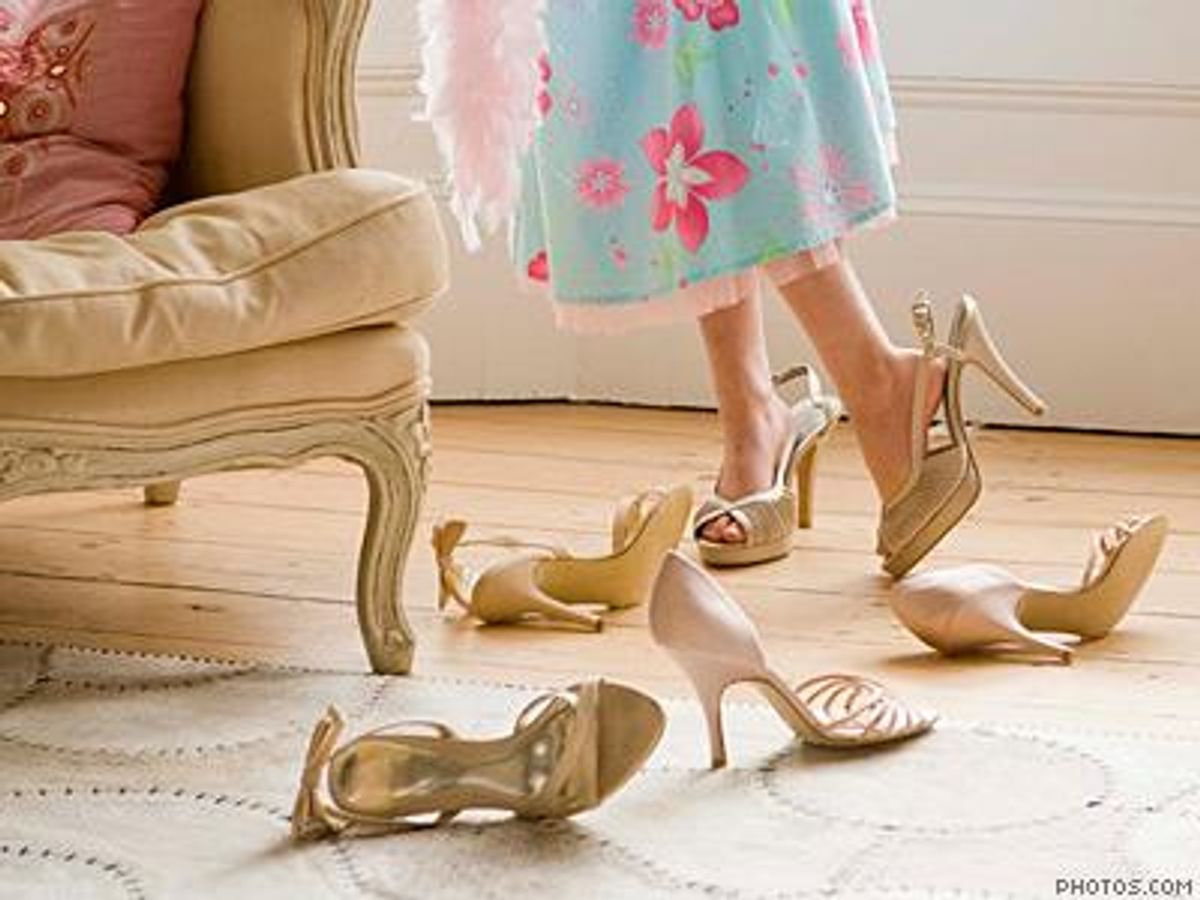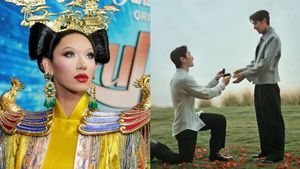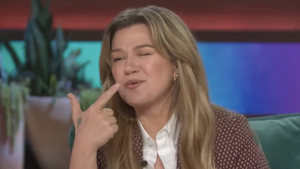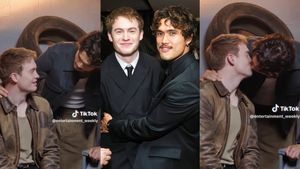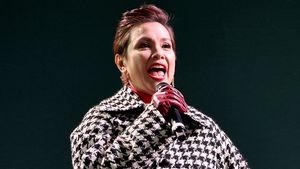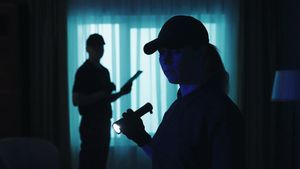All Rights reserved
By continuing to use our site, you agree to our Private Policy and Terms of Use.
When I first learned to read on my own, I started reading in reverse. This wasn't the way I was taught. My mother forced me to read like everyone else, beginning with the page on the inside cover, trudging forward until your story has its happy ending. I always wanted to know how it ended first, making my way to the left as if I were reading it in a parallel universe, a perfect reflection of ours. I convinced myself that if I tried hard enough, I could put my arm through the mirror and step through to the other side, where I could live in reverse.
I guess it makes sense, then, that I came out backward.
At the age of four, I told my mother that I wanted to be a girl. I didn't want to be a boy anymore. This couldn't have been a surprise to my mother. I'd been expressing my preference for All Things Girl since I learned to speak. The only crayon I ever wanted to use was hot pink, my favorite color. I drew pink trees and pink dinosaurs, a world where the sunshine was pink and you went to sleep under a silky salmon sky.
Trending stories
Once when I went shoe shopping with my mother, I insisted on Barbie shoes. Not only were they the doll's signature Pepto Bismol tint, they also came with sequins and glitter, all of it the brightest shade of paradise I had ever seen.
Over the phone, I recently asked my mother why she wouldn't let me have the shoes. She responded, "I didn't want you to get picked on. I loved you and didn't want to see you hurt."
My mother made a bargain with me. If I bought a pair of blue shoes from the boys' section, we could get McDonald's on the way home. She knew that I would never turn down a chance for Chicken McNuggets with sweet and sour sauce -- my favorite food -- and I wasn't willful enough yet to see the game she was playing. I told the shoes I would come back for them.
If I couldn't wear the shoes, I relished the opportunity to be the girl any chance I got. When I played video games with my father, I always wanted to be the female avatar, and if anybody else tried to join up with my gender, I told them no -- because there was only room for one woman here. From a young age, I spoke with what sounded like a Boston accent -- saying "qwah-tahs" instead of "quarters" -- and it sounded like I was shouting, "I'm the goyle!" But my parents understood what I meant.
One day when I came home from daycare, I decided I wanted to be the "goyle" all the time. I informed my mother that she was no longer to call me "Nicky," the pet name that everyone used to differentiate me from my father, whom I was named after. My name was Alice now, just like the girl traveler from Lewis Carroll's story. It was time to stop dreaming about her adventures and start having some of my own.
My mother told me that I couldn't be Alice. I could only be myself. She reaffirmed that I was "Nicky." I corrected her, affirming that I was a girl now and there was nothing she could do about it. Mother reminded me that I was the way God made me, but to me, God was like Santa Clause. God was someone you never saw, unless you were really good or really bad, and he made miracles happen, his version of Christmas presents. If Santa could give me an Etch-a-Sketch, as close as miracles get when you're four, why couldn't he give me this?
I couldn't accept that I wasn't the person that lived inside my head. Alice was more than a storybook character. She was as real to me as any person, the thing I wanted to be when I looked at myself in the mirror. I had long hair, refusing to cut it for anyone, but that didn't make me into the person I wanted people to see me as. It didn't make me her, but I could at least pretend. My daycare had an array of princess dresses in its surprisingly vast costume closet, giving me every option from Belle to Ariel. There was no Alice, who I was reminded wasn't technically a Disney princess, so I settled on Cinderella. It seemed like next best thing.
Every day I would change out of my boy clothes and into my princess dress, talking as her and walking as her. I wasn't the Cinderella who stayed locked away in her room, waiting to be rescued. I was living the fairy tale, the happily ever after that we never get to see. My Cinderella was the queen of her kingdom, a benevolent overlord beloved by her loyal subjects. The country was at my command, and if we wanted to stage an impromptu Rogers and Hammerstein musical, my wish was everyone's command. If anything, I was a budding Evita Peron, a portrait of the dictator as a young lady.
At home I wore a purple cape, unwilling to give up my nobility even when I was off the throne. When it was just my mother and me, she let me be whoever I wanted, even if that was a princess in disguise. I knew where her high heels lived, and if she didn't let me have them, I would get them myself. If I couldn't wear Barbie's shoes, I could still walk tall.
However, our pact had one condition: I couldn't be a girl when my father was around. I was less than a year old when my father went into the Navy. He came home after about six weeks, not able to meet the physical requirements of basic training. When he ran, my father claimed that he felt shin splints in his leg. My mother thought he was scared. I think he was just a boy, not ready to die for anything, let alone his country. But when he was around, my father was the man of the house. I remember his chest hair and his beard, the way he seemed to be covered in prickles and porcupine needles. Every part of his face tickled, and when he would blow raspberries on my stomach, I laughed so hard it felt like a small death.
Even more than I wanted to be a girl, I wanted to make my father happy. He was obsessed with our local team, the Cincinnati Bengals, and I dreamed of hometown glory right along with him. My father watched every game from what felt like the center of our living room, but since I was born, there wasn't much glory to go around. The team's last great season was in 1988, when we faced the San Francisco 49ers in the Super Bowl. Not only did we lose by four points, but our star defensive tackle, Tim Krumrie, sustained the most dramatic injury in Super Bowl history. My father claims that you could watch his leg shatter onscreen as Niners running back Roger Craig crushed both of his lower leg bones. After 1990, the Bengals have yet to make the playoffs.
I've never been a superstitious person, but I couldn't help but feel connected to the team's misfortunes. I always felt like my father thought the same way, even if I know now that wasn't the case.
Before I started elementary school, my father went to the local community college to meet with a psychology professor about my "condition." My parents didn't know what to do with a transgender kid, especially my father. All he knew was football, and I could put away the dresses and the high heels, but I couldn't hide who I was. I wasn't any good at it. I dotted all of my Is with hearts and stars and spelled "Nicky" alternatively as "Nicki," "Niki," "Nikki," "Nikke," "Nickie" and "NiCkEe*," as if I were auditioning for the role of a truck stop waitress. Even if he couldn't name what was happening, he knew there was something here he wasn't prepared for.
The psychologist told my father that there was nothing he could do about it. My father had to let me be who I was and decide for myself. He could fight it or let go and stop struggling. Having children is a lot like drowning that way. You have to let yourself fall.
Meanwhile, my mother took English classes at the college, where I would sit in on her spelling tests and outscore her. During an oral pop quiz, my hand would always be the first one up, ready to show that I knew how to spell "anxious." No matter what I did as a child, I always stood out, whether it was wearing dresses or trying to be the first with the answer. I just wanted to be noticed and seen for exactly the person I was, even if I wasn't sure who that was yet.
When it came time to go to school, the administration wasn't sure where to put me. I already knew how to spell and to count, so much so that I spent an entire day proving to my entire family that I could get all the way to 1,000. When I would lose my place, I started right over again at the beginning -- because I wanted to do it right. I offered to show the administrators, but they wisely declined. Instead I had to take a test that was a lot like a drunk driving test, where I had to walk a straight line and say the alphabet backward, but not at the same time. While also confirming my sobriety, at the end of the test I ended up in the first grade, having to grow up twice as fast as I was ready for.
At school, I didn't know which version of me my mother wanted. Could I be the girl who pranced around on tiny stilts built into my shoes, or was I the boy who ended up rooting for the wrong team? As the Bengals' record declined, I moved onto the Kansas City Chiefs, never wanting to bet on a loser. During the 1993 season, the Chiefs picked up Joe Montana from the 49ers, the former star quarterback who lost his job to Steve Young after being out the past two seasons with injuries. Montana had led the Niners to their 1988 comeback win against the Bengals, and my choice ran counter to the plays my dad was calling in our house.
During a long car trip, my beloved Kansas City Chiefs hat disappeared out the window, never to be seen or heard from again. But in the weeks leading up to my first day at school, during what felt like an endless summer swell, we played football like nothing mattered. We had a Sega Genesis at the time, the gaming system du jour, and my father always won as big as he could, crushing me so I could get used to defeat. He wasn't the type to let me win. I had to earn it. However, I started to win on my own terms, beating him at his game. My Chiefs eked out small victories as my father blamed it on his controller, certain that my victory had been caused by technology. But I knew differently -- that with time and a little practice, my team could be a contender.
After my first day at school, I let them cut my hair. For my debut as an erudite elementary school student, I wore my Cincinnati Bengals t-shirt, my father's favorite. But all day my teachers and classmates thought I was a girl. My nametag said "Nicholas." Is this who I was supposed to be today? Everything got too confusing to keep up with, and when my bus driver complimented me on "what a pretty little girl" I was, I screamed, louder than I believe I intended. I informed her, "I don't want to be a girl! I'm a boy! A boy!" It was a hard decision for a five-year-old to make, but I didn't feel like I had many other options.
I wish I could remember the first time I tried on a dress; what the material sounded like when I twirled, or what my face felt like when the blood and excitement turned me into my favorite color. I do remember, however, the last time I tried on a dress. It was last Halloween. I wanted to go as Chloe Sevigny, but I ended up looking more like Kurt Cobain. I came out as genderqueer a few years ago, because I always thought about myself as without a gender, unformed somehow. I was that kid who never made a choice, because he didn't know how.
But the moment I put on Chloe's dress, I knew that I didn't feel right inside of it anymore. It wasn't my dress. It was Alice's. I threw away my wig in the garbage can, but I kept the heels and the purse -- because they were expensive. As I wiped away my makeup, I looked at my face as if seeing it for the first time. I didn't know if it was the person I was born to be, but it was the person I was. I've always been grateful to my parents for giving me the limited space to figure out my own identity and work out my gender for myself, even if they didn't always do a great job of it. They did the best they could with what they were given, and I know that Alice would have been loved and seen for exactly who she was. All she needed was a little practice.
Somewhere inside, I always lived with the expectation that I would become her one day, but eventually I had to start having my own adventures. I don't know where she is, but I hope she's looking at me with a backwards smile, proud of who I became instead. I am me. On most days, that's enough.
NICO LANG is a correspondent and blogger for WBEZ (Chicago's NPR affiliate), the cocreator of In Our Words, and a graduate student in DePaul University's Media & Cinema Studies program. He writes about LGBTQ issues in Chicago and contributes to the Los Angeles Times,Thought Catalog, and The Huffington Post.

